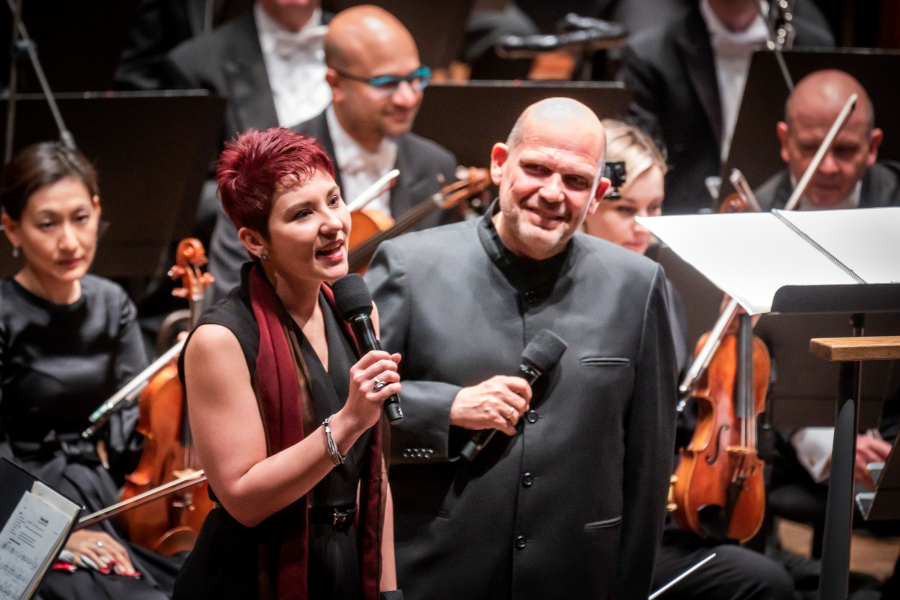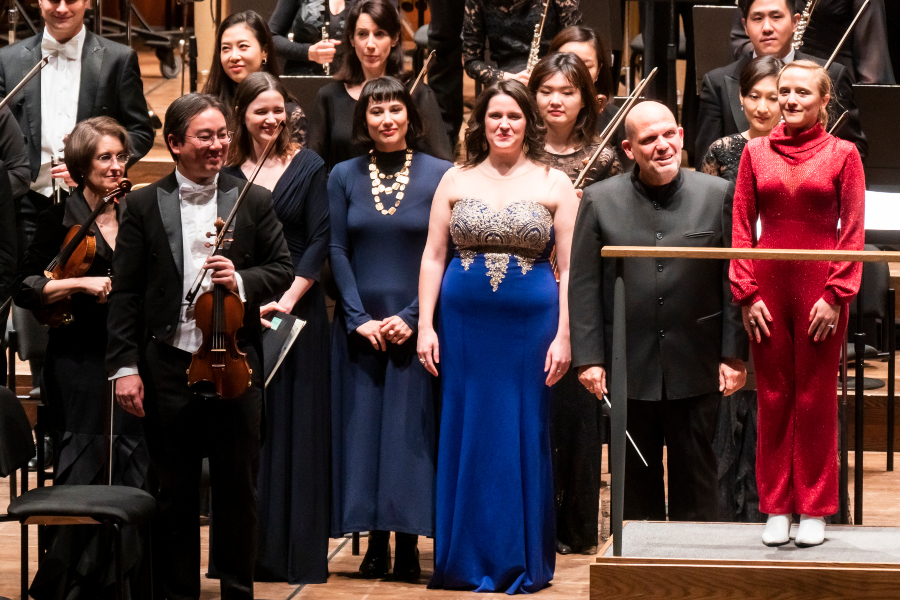Back in 2009, when I first fell in love with going to the symphony, I never would have imagined that I’d someday be typing the words “I heard three orchestral premieres by living women composers in the past 10 days.” A decade later and here we are: The New York Philharmonic has begun its “Project 19” initiative celebrating the centenary of the 19th Amendment, which granted white women the right to vote. Nineteen women have been commissioned to write new chamber and orchestral works over the course of the next year as part “the largest women-only commissioning initiative in history”—the brainchild of Deborah Borda, who proclaimed herself “not only the first woman, but the first lesbian to manage a major American symphony orchestra” at a recent public event exploring equity and access in the orchestral world.
However, it’s also important to keep in mind what Tania León, one of the 19 composers, pointed out prior to the premiere of her piece. León reminded the audience that this initiative is commemorating a milestone that only affected white women, not women as a larger group. It was somewhat embarrassing to witness the general air of privileged disbelief as the predominantly white audience murmured in shock (“I didn’t know that!”) upon learning that women of color couldn’t vote until 1965.
León addresses that 45-year gap towards the end of her piece, as she explained to a sea of rapt listeners at David Geffen Hall. (Later that week, León also programmed a late-night “Nightcap” concert, exposing these “traditional” concert-goers to rich non-Western textures and improvisations, as well as the virtuosic strumming of Colombian harpist Edmar Castaneda.)
In addition to León’s work, the opening weeks of Project 19 featured five further premieres – including two for orchestra – throughout the month of February.
Nina C. Young (L) and Jaap van Zweden
Photograph: Chris Lee/New York Philharmonic

León’s orchestral premiere, Stride, weaves together her longtime admiration for Leonard Bernstein with her more recent research into the life of Susan B. Anthony and the fight for women’s suffrage. Prior to the premiere, she discussed the narrative and political trajectory of her 15-minute piece with conductor Jaap van Zweden. Of Susan B. Anthony, León explained that “I was trying to understand her stride—pow!” and the music grew into an homage not only to Anthony, but to the music of the U.S. more broadly.
León praised the Philharmonic for its “audacity to commission 19 composers who happen to be women,” but also pointed out that Project 19 marks the centenary of an amendment that did not grant all women the right to vote. Within that vein, the ending of her piece grapples with the gap of 45 years, between 1920 and 1965, during which women of color could not vote. León’s interjections with the clavé, as well as her use of silence during the final segments, were a stark musicalization of what she referred to as “women of color going on strike.”
The piece up to that point was cinematic and exciting, full of motion and excited echoes of a distinctly Bernsteinian Americana; what it lacked in tension, it made up for in its quickly shifting layers of textures and expansive palette of flavors and rhythms. Stride to my ears captures the dense diversity of New York City – the smells, the sounds, the eight million bodies each living life to the beat of their own private rhythms – more than the audacity of Susan B. Anthony. The impatient woodwinds flouncing past the plodding basses were the perfect sonification of a vibrant young person dancing past the closing subway doors and heaving a sigh of relief among a crowd of disinterested businessmen.
León’s intended narrative was strongest towards the end of the piece. The change in pace, as 19 tubular bells rang out and the diverse array of percussion tapered off, subtly yanked the listener back to the stark reality of 45 additional years without the vote, and of the quiet persistence of intersectional inequality for women of color.
Two nights prior, I had heard the premiere of Tread softly, composed by Nina C. Young. Like Stride, Young’s piece was thoroughly enjoyable, even humorous at times. Ethereal sustained tones reached for melody and then receded; eventual bursts of a more familiar orchestral drama were quickly snatched into a bogland of unpredictable murkiness, swirling and groaning beneath sporadic shimmery percussion and scattered piano notes.
Of the piece, Young writes in her program note that “One hundred years after the 19th Amendment was ratified, it still seems radical that I can have a voice… and so I ask you, as [the 19 commissioned composers] spread our sounds into your minds, tread softly, because you tread on our dreams.” At the conclusion of her thoughtful and vivid work, an elderly audience-goer sitting behind me turned to his companion and commented in joyful disbelief, “I really liked that!”
Vocalists Martha Cluver, Eliza Bagg, and Estelí Gomez (L-R),
Jaap van Zweden, and Ellen Reid
Photograph: Chris Lee/New York Philharmonic

The most stunning premiere of the month was composed by Ellen Reid, whose opera p r i s m, a shatteringly gorgeous exploration of sexual trauma, was awarded the 2019 Pulitzer Prize for Music. Reid’s When the World as You’ve Known It Doesn’t Exist is a similarly haunting yet beautiful examination of the visceral reality of another type of trauma. The work, which Reid writes “is not directly about the 19th Amendment, but is about unabashedly presenting my artistic voice,” is an exploration of musical color scored for orchestra and three soprano vocalists. When van Zweden asked Reid about her work, she explained that she had focused less on an explicitly political message or a narrative directly tied to the 19th amendment, but rather the feelings of disbelief she (and many others) have been experiencing recently. Reid said that this disbelief can be “disorienting, dizzying, and anxiety-provoking,” and that she wanted to map a journey through that emotional landscape.
Reid’s work so perfectly encapsulates the ghastly, unbelievable quality of contemporary American life that I was nearly moved to tears. When the World as You’ve Known It Doesn’t Exist masterfully conveys the sensation of a living nightmare, from the flute’s spiraling melodies melting downwards to the clarinet solo allowing a brief moment of clarity before being interrupted by the thundering orchestra. Despite the lack of a straightforward political narrative, Reid’s work is once of the most political works of new music that I’ve heard. Her articulation of the sensation of horror – that helpless disconnection from reality that so many of us have been experiencing over the past few years – to my ears was more powerful and moving than many recent new music works that attempt to convey specific horrors. As soon as the 10-minute piece was over, I immediately wanted to hear it again.
Although each of the new works was captivating in its own way, the overall programming occasionally was off-putting. Young’s piece, with its frenzied percussion (including tam-tam, wood blocks, and vibraphone) and woodsy sonic atmosphere, would have been much better paired with Shostakovich than with the Haydn and Mozart works it preceded. León’s premiere was paired with Strauss’s similarly programmatic suite from Der Rosenkavalier, which felt more logical, although a work by Copland, Bernstein, or Gershwin could have given the audience a better context for her musical language.
Ellen Reid’s work kicked off what might have been the most cohesive program. Her meditation on discombobulation was followed by some disturbing excerpts from Anders Hillborg’s The Strand Settings (2012-2013), a more heavy-handed and less musically engaging approach to the same sort of nightmarish environment evoked by Reid’s piece. Up next were two Björk songs, orchestrated by H. Ek and dreamily rendered by the ever-glorious Renée Fleming, swaddled in shades of purple. But the 67-minute Bruckner symphony (No. 4) that followed intermission didn’t carry forward any of the strains of musical thought introduced during the concert’s more radical first half.
One of the most remarkable aspects of these concerts was the overwhelming audience response each evening. The applause for these composers, as van Zweden welcomed them to the stage before their pieces had even been performed, was thunderous and prolonged. Audiences have been waiting so long to hear orchestral pieces by women, and it struck me as somewhat depressing how emphatic we were in our positive reinforcement of what should not have to be a big deal. After all, as León pointed out, these are not “women composers” but “composers who happen to be women.” And Project 19 is hopefully moving us to a place where they will simply be referred to as “composers.”
Rebecca Lentjes is an ethnomusicologist, editor, translator, and feminist activist based in New York City. Her writing has appeared in Music & Literature, NewMusicBox, Sounding Out!, VAN, and TEMPO, among others. Outside the musical sphere, Lentjes can be found volunteering at an abortion clinic and for an abortion fund.
Classical music coverage on National Sawdust Log is supported in part by a grant from the Rubin Institute for Music Criticism, the San Francisco Conservatory of Music, and the Ann and Gordon Getty Foundation. The Log makes all editorial decisions.